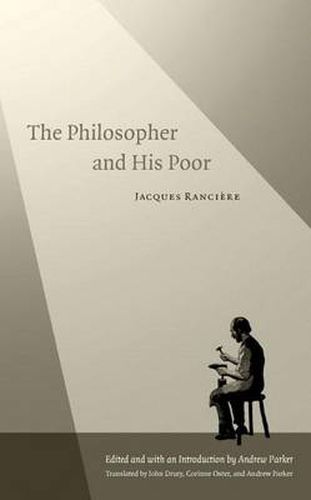Readings Newsletter
Become a Readings Member to make your shopping experience even easier.
Sign in or sign up for free!
You’re not far away from qualifying for FREE standard shipping within Australia
You’ve qualified for FREE standard shipping within Australia
The cart is loading…






Ranciere’s account of Western philosophical thought from Plato to Bourdieu argues that philosophers depend on an ideal poor for their own analyses but preclude them from abstract thought Jacques Ranciere’s The Philosopher and His Poor meditates on what philosophy has to do with the poor in close readings of major texts of Western thought in which the poor have played a leading role - sometimes as the objects of philosophical analysis, sometimes as illustrations of philosophical argument. Published in France in 1983 and made available here for the first time in English, this consummate study assesses the consequences for Marx, Sartre, and Bourdieu of Plato’s admonition that workers should do nothing else than their own work. It offers innovative readings of these thinkers’ struggles to elaborate a philosophy of the poor. Presenting a left critique of Bourdieu, the terms of which are largely unknown to an English-language readership, The Philosopher and His Poor remains remarkably timely twenty years after its initial publication.
$9.00 standard shipping within Australia
FREE standard shipping within Australia for orders over $100.00
Express & International shipping calculated at checkout
Ranciere’s account of Western philosophical thought from Plato to Bourdieu argues that philosophers depend on an ideal poor for their own analyses but preclude them from abstract thought Jacques Ranciere’s The Philosopher and His Poor meditates on what philosophy has to do with the poor in close readings of major texts of Western thought in which the poor have played a leading role - sometimes as the objects of philosophical analysis, sometimes as illustrations of philosophical argument. Published in France in 1983 and made available here for the first time in English, this consummate study assesses the consequences for Marx, Sartre, and Bourdieu of Plato’s admonition that workers should do nothing else than their own work. It offers innovative readings of these thinkers’ struggles to elaborate a philosophy of the poor. Presenting a left critique of Bourdieu, the terms of which are largely unknown to an English-language readership, The Philosopher and His Poor remains remarkably timely twenty years after its initial publication.